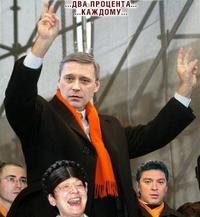

Boris Kagarlitsky
Putin's Phantom Successor
A specter is haunting the back rooms of Russian power. Former Prime Minister Mikhail Kasyanov is appearing to Russian officials both in their dreams and while they are awake, dropping unambiguous hints that he will soon be back on top. Just as any self-respecting ghost should, the former Cabinet head appears and disappears without any visible explanation. His press conferences occur without any rhyme or reason, and he remains silent as the grave when it comes to the most important issues in current politics
. Once upon a time, the press dubbed Kasyanov "Mr. Two Percent," referring to the kickbacks he reputedly demanded from Western bankers who wanted their loans repaid. Today, the former prime minister's supporters never tire of proving these accusations wrong. However, the name has stuck like glue to the retired politician, no matter what people may think of his record.
Regardless of whether Kasyanov was guilty of corruption, his approval rating among the public is hardly more than that infamous 2 percent. This is naturally not nearly enough to win a presidential election, as he from time to time suggests he might.
It would be naive to think that someone cannot become president of Russia just because he is utterly lacking all requisite qualities for the job. The entire history of President Vladimir Putin's political career testifies to the contrary. Yet Putin rose to power thanks to two factors. One, he was a virtual unknown and therefore people could see whatever qualities they wanted in him, even those that contracted one another. Two, the state bureaucrats were all in support of his candidacy. But everyone already knows who Kasyanov is, and while he is not particularly frightening, he also fails to inspire any hope. The bureaucrats today cannot agree on anything.
Kasyanov is not conducting a campaign. He is not attempting to win over supporters and is not making any real promises. Instead, he is lollygagging around and waiting for supporters to come to him. His inaction is reminiscent of the hero in a certain Russian fairy tale who longed to become tsar without climbing down from his cozy perch on the stove. The only difference is that the Russian folk hero at least went out and caught a magic pike, while Kasyanov isn't lifting a finger to do anything.
Strangely enough, this inaction seems to have a hypnotic effect on officials. A political and economic crisis is unfolding at the moment, one that will not be remedied even by stunning economic growth figures. Public confidence in the authorities is plummeting. Leaders at all levels, even at the top, are lost and somewhat spooked. The question of what comes next naturally upsets those who are accustomed to power and creature comforts. Putin's regime cannot last forever, and a successor must be found.
In this situation, Kasyanov has one task: to convince the bureaucrats that he suits everybody's taste, that he has been approved by the West, is convenient for China, acceptable to the opposition and not at all hostile toward current officials. His political blandness is taking on a very attractive sheen. There is just one little problem: How do you sell this kind of candidate to the public? But this bothers Kasyanov the least of all. The folks in government will figure it out. The most important thing is to convince them that they need to.
In the end, the question of whether there is life after politics must also be troubling Putin, not to mention those close to him. For them, the problem of succession has nothing to do with what the next president's name and platform will be or how he will affect Russia. They are most concerned that the president be directly and personally connected to them.
And Kasyanov, as someone who holds no grudges against the Kremlin, may be able to make everyone happy. Especially because he has given no indication that he would radically change the government's current direction.
During the revolutions in Georgia and Ukraine, we saw how official successors can turn unexpected somersaults and rush into the presidential office at the head of the opposition. In Russia, a similar scenario might work in reverse. A candidate, who originally presented himself as a moderate opponent to the regime, could receive the government's blessing and enter the Kremlin with its full support. Thus, it can't be ruled out that Mikhail Kasyanov could become Putin's official successor.
For the bureaucrats, this would be a convenient and simple solution. But for the country, the consequences would be uncertain.
Society does not need a new face; it needs a new direction. And Kasyanov is not offering anything of the kind.
Boris Kagarlitsky is director of the Institute for Globalization Studies.
© Copyright 2005 The Moscow Times.
http://web.themoscowtimes.com/stories/2005/06/09/008.html